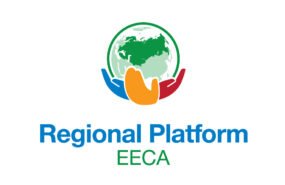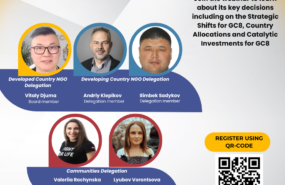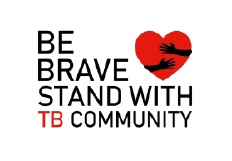Global Fund post-2022 strategy: Report of the community and civil society consultation in Eastern Europe and Central Asia
- 15.01.2021 10:50
- Post Views: 1,302
Purpose
The Global Fund’s Community, Rights and Gender Department commissioned the EECA Regional Platform for Coordination and Communication to conduct a consultation with community and civil society groups in the EECA region on the six predefined topics that are currently being discussed in global consultations regarding the Global Fund post-2022 strategy.
Methodology
Inputs came from nearly 80 stakeholders in 18 countries through four online approaches:
- An online survey was completed by 37 respondents in Russian and 7 in English;
- Four (4) focus group discussions were conducted in the following sub-regions: Central Asia and Azerbaijan; Eastern Europe; Russia; and South-Eastern Europe;
- Nine (9) interviews were conducted with regional experts in the Global Fund structures and other experts in health, human rights, and civil society;
- Consultation with regional community networks and other civil society partners to validate and prioritise the inputs.
The consultation took place in December 2020. An annex provides details of the respondents.
Use of this report
This synthesis report will be submitted by the EECA Regional Platform to the Global Fund Secretariat. The regional representatives could be able to use the final document to inform their relevant Delegations to the Board and at the Regional Partnership Forum to be held in February 2021.
The complex context and review of the underlying causes that are preventing real progress should be considered across the six areas of this consultation.
General observations and recommendations
1. To achieve greater sustainability and impact, the Global Fund has to rethink its role and become fit for purpose to address long-term, systematic obstacles in systems for health, human rights, and gender.
Failure to meaningfully extend health systems to key and marginalised people, and to decriminalise related behaviours, with community and civil society engagement undermines the responses to the HIV, TB, and MDR-TB epidemics and efforts to make them sustainable in the region. COVID-19 has further exacerbated the fiscal challenges and inequalities, i.e. systemic barriers. The key barriers are quite well documented. The cycle of 3-year grants limits the Global Fund’s ability to have a systematic response and a long-term view that is needed for systematic challenges, including retaining institutional memory, matching barriers with long-term and flexible strategies to overcome them, and to ensure accountability from one cycle to another on real progress towards incremental change.
If the Global Fund decides to seriously address systemic obstacles, several changes will be needed: a longer-term view and investment; more political leveraging; revised incentives and communication to countries, matched with technical assistance; and recalibrated accountability. Some measures are highlighted in the recommendations below.
2. The Global Fund can, and should, use its political leverage with governments and partners.
Informants from countries across the continuum of transition have emphasised this issue. The Global Fund has been shy from using its potential in dialogue with countries and in engaging other partners, such as the European Union (EU), in increasing investments in key population programming, and the civil society watchdog and governance functions in the countries that are negotiating membership in the EU. Partnerships with the World Health Organization (WHO), the World Bank, or with trusted leaders could be used to amplify strategic dialogue and diplomacy, particularly in health reforms and universal health coverage (UHC). Some informants have mentioned the need to engage senior leadership, highly respected leaders at the country level, or cross-country diplomats. Country situations are different and, therefore, approaches should be more nuanced. Portfolio managers should be aligned with Global Fund values but might not be the best primary leaders for advocacy. This political dialogue is particularly critical for sustainability, addressing human rights, gender, and age barriers where few partners remain.
“It is important not to underestimate, and not to overestimate, the [potential] influence of the Global Fund, even in the context of the Russian Federation. The Global Fund should be politically thoughtful.” (Russia FDG)
“Increased advocacy functions will require assessing what to do and who would do that. You need to include someone who has the trust of society, who is politically and culturally sensitive, highly skilled, and with a reputation on the line, maybe from the country or someone like Michel Kazatchkine. Let’s be honest, not all [Fund Portfolio Managers] FPMs have those abilities.” (Key informant)
3. The Global Fund should invest more in policy dialogue and advocacy through multi-country grants, and technical support. The EECA priority issues are:
- sustainability in HIV and TB responses with relevant changes in systems for health;
- post-transition efforts;
- decriminalisation of populations;
- reforming TB models of care;
- maintaining civil society space in Russia and similar settings; and,
- advocacy for greater investment in health, with greater transparency, more dynamic systems that engage civil society and communities in services and monitoring.
Country grants are not able to fund advocacy activities that target the authorities. Other donor funding for advocacy in drug policy, sex work decriminalisation, or civil society infrastructure, is reducing. Special and catalytic initiatives are helpful but in the EECA region they are limited to very few countries. Multi-country initiatives are better positioned to support advocacy. Strong learning is needed to acknowledge and address current limitations in the Global Fund’s approach to multi-country initiatives and advocacy funding for both HIV and TB, particularly on the ability to focus on long-term changes and not just quick results.
“Advocacy funding is too limited and not strategically distributed. Advocacy should not be an afterthought. We need a different system to monitor its success and failure.” (Russia FDG)
“Country grants have little money for advocacy – the CCM will not ask for money to advocate themselves”. (Key Informant Interview (KII))
4. The Global Fund M&E systems should be adapted for advocacy and accountability for advancing reforms.
The current results-based approach focused on the diseases does not suffice to track progress (and not just process) in systems, and cultural changes and sustainability. Reforms and advocacy take time, and in most cases cannot produce short-term results. The current monitoring, evaluation and learning framework is ill-equipped for reforms and advocacy, i.e. for planning, monitoring and establishing adequate accountability for addressing well-known systematic barriers. Often process and activity indicators are used to measure reforms and advocacy, giving the wrong incentives, such as producing plans and not the actual progress on the implementation of those plans.
5. Sustainability and transition work should be prioritised, more systemic, reducing the current fragmentation across Global Fund policies and initiatives.
Sustainability in the context of the Global Fund and other donor transition, and limited progress towards the global targets, is the priority for the EECA region. It deeply interlinks with multiple areas, including the 6 topics of this consultation. While the STC policy makes references to other streams of work on human rights, health systems, community systems, etc., in practice the streams are vertical and disconnected across the work of the secretariat, the communication to countries, and the learning systems. This fragmentation misses potential synergies to overcome underlying causes and barriers to systematic barriers.
6. The Global Fund should remain the catalyser and promoter of national dialogue, partnership, and multi-sectorality – with a strong civil society and communities.
The Global Fund’s founding principle of the country dialogue and CCMs is critical to sustaining and expanding health systems, with civil society, affected communities, local authorities and local academia further emphasised in the Global Fund’s policies and instruments.
7. Support for civil society and affected communities is becoming even more critical in the EECA region and requires greater flexibility, reflecting the dynamic times and the increased toxic spaces for civil society.
COVID-19 has provided additional proof of the resilience and flexibility by civil society and community systems to meet challenges and to prioritise the vulnerable. Many changes in UHC, sustainability and political commitment have been driven by civil society. In countries that are advanced in the transition continuum, civil society and communities receive less funding, or less funding opportunities, outside of resources provided by authorities. Hence, the Global Fund’s small strategic investments in civil society and affected communities can have major value-added.
Related News
Services for migrants and refugees from Ukraine – HIV/TB care with a focus on key populations
Due to the increasing flows of refugees from Ukraine because of Russia’s invasion of Ukraine, the EECA Regional Platform created a spreadsheet to fill contacts details of face-to-face and online services for refugees and migrants (with a focus on HIV/TB care and key population groups).
Regional Platform – EECA
This web-resource is a part of new regional communication and coordination project “Regional Civil Society and Community Support, Coordination and Communication Platform - EECA”, implemented by Eurasian Harm Reduction Association (EHRA).
Tags
See also
-
EECA’s Regional Platform monthly Newsletter #21, February 2026 26.02.2026 11:56
-
EECA’s Regional Platform monthly Newsletter #20, January 2026 27.01.2026 12:58
-
Global Fund Eligibility List 2026 27.01.2026 11:19







